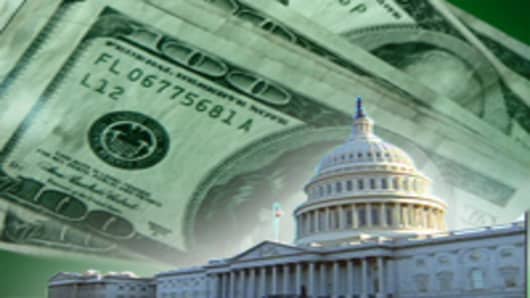This week's problems at Fannie Mae and Freddie Mac are more evidence of a painful fact for the economy: the extent to which mortgage-related debt is exacerbating the current slide, and how it will prolong what more and more analysts are calling a recession.
Piles of high-risk debt offset by comparatively little capital led the two mortgage giants into their current capital issues. The same situation is being played out in countless banks across the country, where billions of dollars in mortgage holdings are rapidly losing their value as housing prices plummet and foreclosures accelerate.
The sum total of the damage: a recessionary environment that may not seem as deep as other economic downturns, but which could last longer as banks work their way through the myriad problems caused by a lack of liquidity.
Consumer, banks, investors, Corporate America-everyone is going to feel pain from the depths of their debt and their efforts to get out from under it.
"The debt crisis that we've got here is significant," said Sebastian Leburn, chief investment officer at Weiss Capital Management in Del Ray Beach, Fla. "It's going to be rippling through the economy for a few years. It's probably going to keep interest rates below where they should be for a considerable period of time."
As banks remain hesitant to loan out money for fear of jeopardizing their balance sheets, the economy will continue to languish. While a typical recession lasts about 10 months, some analysts are expecting this one to last twice as long.
"You're going to see some debt retrenching over the next couple of years, which is going to be a headwind for the economy," Leburn said. "You're going to be dealing with a much slower rate of growth for corporate profits for some time."
Weiss Capital has taken the position that the economy already is in a recession—and has been in one since late 2007—even though some indicators, such as gross domestic product, don't necessarily indicate one in a technical sense.
Falling housing prices triggered the recession, Leburn said. Lower property values not only hit homeowners but also lending institutions and the holders of complicated financial vehicles whose value was tied to real estate. Lenders like Freddie and Fannie , meanwhile, were allowed to hold cash reserves far below the value of the debt they were guaranteeing, leading Lehman Brothers on Monday to question the capital positions of the two government-sponsored enterprises and setting off a frenzy on Wall Street.
Echoing Through the Economy
In the economy, such problems play out in a number of ways.
In order to inject liquidity back into the marketplace, the Federal Reserve since September has embarked on an aggressive rate-cutting strategy intended to encourage banks to lend. But banks instead have become far tighter with money, both on fears of defaults and foreclosures and in an attempt to shore up their battered balance sheets.
The result has been a dual debt-and-credit crisis that analysts expect to take several years to unwind and which will stand in the way of any major upsurges for the economy.
And with the economy badly needing growth, the Fed is unlikely, as some have been advocating, to raise rates, which would be a further incentive for banks to tighten money. At a time when consumers are getting pounded by rising energy prices, the economy can hardly stand anti-growth policies, Leburn said.
"Ultimately the US is just highly indebted to the world. Until we enact some more longer-term prudent fiscal measures that contain spending and we don't listen too much to special-interest groups ... until we put some kind of fiscal restraint on our government, it's going to be a challenge for the country," he said. "The United States is still the greatest country in the world. We'll get through it. This will probably make us stronger, but we have to go through some pain."
Tom Higgins, chief economist at Los Angeles-based Payden & Rygel, also believes the economy is in recession and calls talks of a Fed rate hike "ludicrous." Higgins pointed out that most lending rates actually have climbed since the central bank started cutting rates, and increases at this point would only add to the pain.
With money as tight as it is, consumers saddled with about $14 trillion in personal debt cannot be relied upon to guide the economy from its doldrums. That has led Higgins to conclude that while the recession may be shallow and end perhaps by the close of 2008, the recovery will be so slow that it might be hard to tell the difference.
"Let's say that when the economy is firing on all cylinders, growth is about 3.5 or 4 percent. We'll probably be growing south of 2 percent for an extended period of time, and that's primarily because consumer spending is going to become lackluster," he said. "The economy will have to rely on exports and hopefully business activity to drive economic activity."
The Fed may start to look at rate increases to control inflation by June 2009, after the worst of the financial crisis has passed, Higgins said.
In the near future, economists may find deflation a more pressing problem, both Higgins and Leburn said, as home prices continue to deteriorate and people see the value of their most precious asset decline.
From an investment standpoint, Leburn said stocks will be highly risky. He recommends high-quality bonds, traditional Wall Street leaders and some commodities. Only after the debt crisis unwinds will it be safe to get back in the market.
"The issue we have is the massive amounts of credit in the system," he said. "However you measure it, private debt is off the charts."


